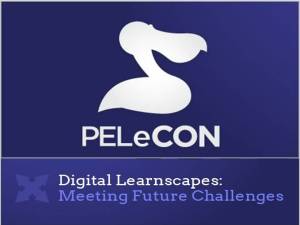It’s neat that the title of this week’s POTCert class is Personal Learning Networks (PLNs), seeing as I’m off to PELeCON this week and looking forward to meeting up with people that I consider to be a significant part of my PLN. 🙂

I’ve mentioned before on this blog how it was a combination of Steve Wheeler’s, or rather @timbickteeth‘s “trivial and terrific tweets” that alerted me to the potential of Twitter, but I’ve not mentioned before that I was “Jenny-No-Mates”, the only student on an on-campus taught masters course about technology who desperately needed some classmates to learn with. And that’s what a PLN gives you, class mates to learn with!!
Connecting with people online has enabled me to go on and build a really useful PLN. How otherwise would I have learnt of Lisa Lane’s open online course, Pedagogy First?
Coming back to which, one of the readings for this week’s class is an article by Gardner Campbell (2009), entitled A Personal Cyberstructure, where he calls for students to be instructed and supported in developing the infrastructure of the Web to develop a personal learning environment of their own. This resonated with me completely; in fact, I was thinking of calling this post something like “this be the verse”, that is, until I realised that I could get what I think is commonly referred to as a “twofer”, and use it as a precursory blog to PELeCON. Anyway, here’s what Gardner Campbell says,
in building that personal cyberstructure, students would not only acquire crucial technical skills for their digital lives but also would engage in work that provides richly teachable moments ranging from multimodal writing to information science, knowledge management, bibliographic instruction and social networking. Fascinating and important innovations would emerge as students are able to shape their own cognition, learning, expression and reflection in a digital age, in a digital medium. Students would frame, curate, share and direct their own “engagement streams” throughout the learning environment.
It sounds like a pretty awesome digital learnscape to me, and which just so happens to be the strap-line for this year’s conference as well. What’s more though, Gardner Campbell goes on to say that educators should lead by example, “students must be effective architects, narrators, curators, and inhabitants of their own digital lives”. Here. Here. That’s why, in the last year, I’ve heeded the advice of Martin Weller regarding “The Virtues of Blogging as a Scholarly Activity” and I’m trying to go some way towards Alec Couros‘ vision of “Teaching and Learning in a Networked World”, both of which form part of this week’s reading as well. Incidentally, Alec Couros spoke at last year’s conference. At the time though, I didn’t really understand his message. I just recall that he was passionate about taking photos of his everyday life and sharing them online. I get it now, it’s about promoting openness and taking charge of your own digital identity… and, I’d also like to think, your own destiny as well.
Entitled, “Taking Advantage of New Opportunities”, the final chapter of the POT Cert course textbook, which is also signposted reading this week, starts
Because online education is a relatively new enterprise, you have an opportunity to make a positive contribution to this growing field. To take full advantage of this new opportunity, you would do well to keep yourself informed of the latest trends and issues and to continually improve your skills and knowledge.
Well, that’s what I’m endeavouring to do. You see, I live in a beautiful, yet ultimately peripheral location in rural Ireland, but I’d like to think that I could expand my horizons and take my passion and insight for digital literacies and social learning online, so if I may, I’d like to share a few slides with you (1 min), introducing myself and where I live. Originally, I intended to put this together as my digital introduction for #etmooc, but I never got round to finishing it on time, so hopefully it will serve nicely as my networking introduction to what looks like is going to be a great conference.
As always, I’ll keep you posted #pelc13 #POTCert
References:
Campbell, Gardner (2009) A Personal Cyberstructure. Available at: http://www.educause.edu/ero/article/personal-cyberinfrastructure
Weller, M. (2010) The Virtues of Blogging as a Scholarly Activity. Available at: http://chronicle.com/article/The-Virtues-of-Blogging-as/131666/
Ko, S. & Rossen, S, (2010) Teaching Online: A Practical Guide, Third Edition. Taylor & Francis. Kindle Edition.

This work is licensed under a Creative Commons Attribution-NonCommercial-ShareAlike 3.0 Unported License.

